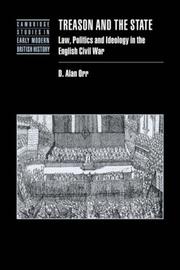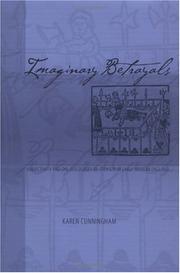| Listing 1 - 2 of 2 |
Sort by
|

ISBN: 9780521037334 0521037336 9780511495960 9780521771023 0521771021 051106666X 9780511066665 1107128641 1280160160 0511118317 1139146262 0511060351 0511331061 051149596X 0511068794 Year: 2002 Publisher: Cambridge Cambridge University Press
Abstract | Keywords | Export | Availability | Bookmark
 Loading...
Loading...Choose an application
- Reference Manager
- EndNote
- RefWorks (Direct export to RefWorks)
This study traces the transition of treason from a personal crime against the monarch to a modern crime against the impersonal state. It consists of four highly detailed case studies of major state treason trials in England beginning with that of Thomas Wentworth, first Earl of Strafford, in the spring of 1641 and ending with that of Charles Stuart, King of England, in January 1649. The book examines how these trials constituted practical contexts in which ideas of statehood and public authority legitimated courses of political action that might ordinarily be considered unlawful - or at least not within the compass of the foundational statute of Edward III. The ensuing narrative reveals how the events of the 1640s in England challenged existing conceptions of treason as a personal crime against the king, his family and his servants, and pushed the ascendant parliamentarian faction towards embracing an impersonal conception of the state that perceived public authority as completely independent of any individual or group.
Treason --- Trials (Treason) --- History --- Great Britain --- Politics and government --- High treason --- Political crimes and offenses --- Sovereignty, Violation of --- Subversive activities --- Arts and Humanities

ISBN: 0812204271 0812236408 Year: 2002 Publisher: Philadelphia : University of Pennsylvania Press,
Abstract | Keywords | Export | Availability | Bookmark
 Loading...
Loading...Choose an application
- Reference Manager
- EndNote
- RefWorks (Direct export to RefWorks)
In 1352 King Edward III had expanded the legal definition of treason to include the act of imagining the death of the king, opening up the category of "constructive" treason, in which even a subject's thoughts might become the basis for prosecution. By the sixteenth century, treason was perceived as an increasingly serious threat and policed with a new urgency. Referring to the extensive early modern literature on the subject of treason, Imaginary Betrayals reveals how and to what extent ideas of proof and grounds for conviction were subject to prosecutorial construction during the Tudor period. Karen Cunningham looks at contemporary records of three prominent cases in order to demonstrate the degree to which the imagination was used to prove treason: the 1542 attainder of Katherine Howard, fifth wife of Henry VIII, charged with having had sexual relations with two men before her marriage; the 1586 case of Anthony Babington and twelve confederates, accused of plotting with the Spanish to invade England and assassinate Elizabeth; and the prosecution in the same year of Mary, Queen of Scots, indicted for conspiring with Babington to engineer her own accession to the throne. Linking the inventiveness of the accusations and decisions in these cases to the production of contemporary playtexts by Udall, Shakespeare, Marlowe, and Kyd, Imaginary Betrayals demonstrates how the emerging, flexible discourses of treason participate in defining both individual subjectivity and the legitimate Tudor state. Concerned with competing representations of self and nationhood, Imaginary Betrayals explores the implications of legal and literary representations in which female sexuality, male friendship, or private letters are converted into the signs of treacherous imaginations.
Sex role in literature. --- English drama --- Law in literature. --- Betrayal in literature. --- Treason in literature. --- Trials (Treason) --- Subjectivity in literature. --- Law and literature --- Treason --- History and criticism. --- History --- Law. --- Literature. --- Medieval and Renaissance Studies.
| Listing 1 - 2 of 2 |
Sort by
|

 Search
Search Feedback
Feedback About UniCat
About UniCat  Help
Help News
News